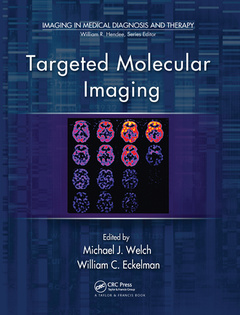Targeted Molecular Imaging Imaging in Medical Diagnosis and Therapy Series
Coordonnateurs : Welch Michael J., Eckelman William C.

Targeted Molecular Imaging covers the development of novel diagnostic approaches that use an imaging probe and agent to noninvasively visualize cellular processes in normal and disease states. It discusses the concept, development, preclinical studies, and, in many cases, translation to the clinic of targeted imaging agents.
The many case studies that form the core of this book deal with the development and translation of non-nuclear probes and radiotracers; other sections address critical topics such as In vitro studies, small animal research, and the application of targeted probes for nuclear, optical and MRI imaging. The chapters use a common format to demonstrate how various investigators approach the comprehensive task of validating a new targeted probe.
Targeted Molecular Imaging is a timely resource for a rapidly advancing field, and addresses:
- Various methods of validating a new targeted probe through examples from human studies with imaging of breast cancer, cardiovascular disease, and neurodegenerative diseases
- Basic principles, disease models, imaging studies in animals, imaging in initial human studies, and the application of molecular imaging in pharmacy and drug discovery
- In vitro studies, small animal studies, and targeted radiopharmaceuticals
Using these case studies, investigators can generalize and apply the information to their own specific targeted probe. The insights provided by the contributors, experts who have developed these approaches in their own groups, help guide scientists planning to translate imaging agents from the concept stage to clinical application.
In Vitro Studies. Small Animal Studies. Radiopharmacology and Radiopharmacy. Case Studies on Developing Target Nonnuclear Probes. Case Studies on Developing Targeted Radiotracers.
Dr. Michael J. Welch is Professor of Radiology, Professor of Chemistry, Professor of Developmental Biology and Professor of Biomedical Engineering at Washington University, St. Louis. He is a recipient of many honors; these include the Paul C. Aebersold Award, the Georg Charles de Hevesy NuclearPioneer Award and the Cassen Prize from the Society of Nuclear Medicine and the St. Louis Award, the Midwest Award and the National Award for Nuclear Chemistry from the American Chemical Society. He has served as President of the Society of Nuclear Medicine and in 1999 was elected to the Institute of Medicine of the National Academy of Sciences. Dr. Welch received a bachelor’s degree from Cambridge University, England and a Ph.D. in Radiochemistry from Queen Mary College, London. His primary research interests involve the development of novel PET agents, particularly targeting cancer and cardiac disease.
Dr. William C. Eckelman is presently Professor of Radiology at UCSD and the president of Molecular Tracer LLC. A pioneer in Tc-99m radiopharmaceutical development, he and colleagues developed the Instant Tc-99m Kit, which became the basis for all subsequent 99mTc radiopharmaceutical kits, and targeted receptor-binding radiotracers for human use for both SPECT and PET, including the first neuroreceptor image in humans. Dr. Eckelman has been the editor-in-chief of Nuclear Medicine and Biology since 1985. He received numerous awards including the Paul C. Aebersold Award, the Institute of Clinical PET Distinguished Scientist Award, the American College of Nuclear Physicians Corporate Achievement Award, the Georg deHevesy Nuclear Pioneer Award, the Great Golden Seal of Padua University in recognition of contributions to Radiopharmaceutical Development and the Society of Radiopharmaceutical Sciences President’s Award.
Date de parution : 06-2020
21x28 cm
Date de parution : 04-2012
Ouvrage de 388 p.
21x28 cm
Thèmes de Targeted Molecular Imaging :
Mots-clés :
NIRF; AT1 Receptor; Small Animal Studies; Targeted Molecular Imaging; Radiopharmacology and Radiopharmacy; Ch Ap; Case Studies on Developing Targeted Non-Nuclear Probes; Pet Imaging; Case Studies on Developing Targeted Radiotracers; Metastatic Breast Cancer; In Vitro Studies; Acetyl CoA Carboxylase; Imaging Agents; AT1; Bioluminescence Imaging; Molecular Imaging; Myocardial Blood Ow; Myocardial Fatty Acid; Σ2 Receptors; Pet Radiotracer; Radioligand Binding; Blood Clearance Curve; Fatty Acid Oxidation; Aer Injection; Radiochemical Yields; HPLC Purication; Norepinephrine Transporter; Net; Vivo Images; ER Expression



